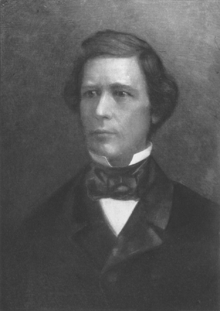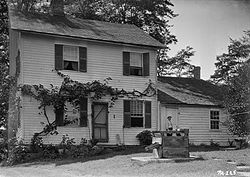- David Wilmot
-
This article is about the politician. For the actor, see David Wilmot (actor).
David Wilmot 
United States Senator
from PennsylvaniaIn office
March 14, 1861 – March 4, 1863Preceded by Simon Cameron Succeeded by Charles Buckalew Member of the
U.S. House of Representatives
from Pennsylvania's 12th districtIn office
March 4, 1845 – March 4, 1851Preceded by George Fuller Succeeded by Galusha Grow Personal details Born January 20, 1814
Bethany, Pennsylvania, U.S.Died March 16, 1868 (aged 54)
Towanda, Pennsylvania, U.S.Political party Democrat, Republican Spouse(s) Anna Morgan Wilmot Profession Politician, Lawyer, Judge Signature 
David Wilmot (January 20, 1814 – March 16, 1868) was a U.S. political figure. He was a sponsor and eponym of the Wilmot Proviso which aimed to ban slavery in land gained from Mexico in the Mexican-American War of 1846–1848. Wilmot was a Democrat, a Free Soiler, and a Republican during his political career. His opposition to slavery did not include the abolitionist position of ending slavery in the entire country, and his views on race, by today’s standards, could be classified as racist.[1]
Contents
Early life
David Wilmot was born in Bethany, Pennsylvania to Randall (1792–1896) and Mary Grant Wilmot (1792–1820). His father was a well to do merchant, and David’s early life was a comfortable one. He was educated at the local Beech Woods Academy and later at the Cayuga Lake Academy in Aurora, New York. Moving to Wilkes-Barre in 1832, he read law under George W. Woodward and was admitted to the bar in Bradford County, Pennsylvania in August 1834. In 1836 he married Anna Morgan and the couple had three children, none of whom survived childhood.[2]
Wilmot practiced law for some time in Towanda, Pennsylvania and was involved in local politics as a strong supporter of Andrew Jackson. Wilmot was elected Representative from the 12th District of Pennsylvania as a Democrat in 1844. He served from 1845 until 1851, in the 29th, 30th and 31st Congresses. He initially supported the policies of President James Polk. Also, as a Representative of a largely agrarian district, he voted for the Walker Tariff of 1846 which made a moderate reduction in tariff rates. Only gradually did Wilmot come to believe that the South was dominating the national government to the detriment of the rest of the nation.[2]
Free Soil and the Wilmot Proviso
Although he opposed the extension of slavery into the territories, Wilmot supported Polk in the initiation of the Mexican War, and was still considered a Democratic Party loyalist. But on August 8, 1846, an appropriations bill for $2 million to be used by the president in negotiating a treaty of peace with Mexico was introduced in the House of Representatives. Wilmot immediately offered the following amendment:
- "Provided, That, as an express and fundamental condition to the acquisition of any territory from the Republic of Mexico by the United States, by virtue of any treaty which may be negotiated between them, and to the use by the Executive of the moneys herein appropriated, neither slavery nor involuntary servitude shall ever exist in any part of said territory, except for crime, whereof the party shall first be duly convicted."
 Wilmot's house in Bethany, Pennsylvania.
Wilmot's house in Bethany, Pennsylvania.
Wilmot modeled the language for what would usually be referred to as the Wilmot Proviso after the Northwest Ordinance of 1787. Although known as the Wilmot Proviso it really originated with Jacob Brinkerhoff of Ohio, Wilmot being selected to present it only because his party standing was more regular. The House, after first voting down a counter-proposal simply to extend the Missouri Compromise line across the Mexican Cession, passed the proviso by a vote of 83-64. This led to an attempt to table the entire appropriations bill rather than pass it with “the obnoxious proviso attached”, but this effort was defeated “in an ominously sectional vote, 78-94".[3] The Senate adjourned rather than approve the bill with the proviso.
A similar measure was brought forward at the next session with the appropriation amount increased to $3 million, and the scope of the amendment expanded to include all future territory which might be acquired by the United States. This was passed in the House by a vote of 115 to 105, but the Senate refused to concur and passed a bill of its own without the amendment. The House acquiesced, owing largely to the influence of General Lewis Cass. As the 1848 presidential election took shape, the Democrats rejected the Wilmot Proviso in their platform and selected Cass as their candidate to run on a popular sovereignty platform. The new Free Soil Party rallied around the Wilmot Proviso, and nominated Martin Van Buren on a platform calling for “No more slave states and no more slave territory.”[4]
By 1848 Wilmot was thoroughly identified as a Free Soiler, but, like many other Free Soilers, Wilmot did not oppose the expansion of slavery based on a moral rejection of the institution itself. In a speech in the House, Wilmot said, “I plead the cause and the rights of white freemen [and] I would preserve to free white labor a fair country, a rich inheritance, where the sons of toil, of my own race and own color, can live without the disgrace which association with negro slavery brings upon free labor.”[5] Around the same time, however, Wilmot, in a New York speech, spoke of the ultimate demise of slavery when he argued, “Keep it within given limits …and in time it will wear itself out. Its existence can only be perpetuated by constant expansion. … Slavery has within itself the seeds of its own destruction.”[6]
Wilmot was presented as the Free Soil candidate for Speaker of the House in 1849 and was soon at odds with the mainstream Pennsylvania Democratic Party led by James Buchanan. Wilmot was forced to withdraw from the 1850 Congressional elections in favor of the more moderate Galusha A. Grow. Wilmot was elected as a presiding judge of the 13th Judicial District of Pennsylvania in 1851, serving till 1861, and he was instrumental in founding the Republican Party in Pennsylvania. He chaired the Republican Party platform committee, was a delegate to the 1856 national convention, and worked vigorously for the first Republican presidential candidate, John C. Fremont, in 1856.[2]
Later career
In 1857 Wilmot was the first Republican candidate for Governor of Pennsylvania, although he lost to William F. Packer. He was a delegate to the Republican National Convention in 1860 and was a key figure in obtaining the nomination for Abraham Lincoln. Wilmot was considered for a cabinet post by Lincoln, but he declined, and in 1861 he was elected to the Senate to fill the seat of Simon Cameron. He served in that body from 1861 until 1863.[2]
He was also a member of the peace convention of 1861, held in Washington, D.C., in an effort to devise means to prevent the impending American Civil War. Wilmot was appointed by President Abraham Lincoln as judge of the Court of Claims in 1863 and served until his death in Towanda in 1868. He is interred in Riverside Cemetery,a Pennsylvania State historical marker is placed at Williams St, at Riverside Cemetery, Towanda identifying the cemetery as his resting place.[7]
Notes
- ^ Foner pg. 60. Berwanger pg. 125-126.
- ^ a b c d McKnight p. 2121
- ^ Morrison, p.41
- ^ Levine p. 183
- ^ Berwanger p. 125-126
- ^ Foner p. 116
- ^ http://www.waymarking.com/waymarks/WM8BT_David_Wilmot
References
- David Wilmot at the Biographical Directory of the United States Congress
 Chisholm, Hugh, ed (1911). "Wilmot, David". Encyclopædia Britannica (11th ed.). Cambridge University Press.
Chisholm, Hugh, ed (1911). "Wilmot, David". Encyclopædia Britannica (11th ed.). Cambridge University Press.- Berwanger, Eugene H. The Frontier Against Slavery: Western Anti-Negro Prejudice and the Slavery Extension Controversy. (1967) ISBN 0-252-07056-9.
- Foner, Eric. Free Soil, Free Labor, Free Men: The Ideology of the Republican Party Before the Civil War. (1970) ISBN 0-19-509981-8.
- Levine, Bruce. Half Slave and Half Free: The Roots of Civil War. (1992).
- McKnight, Brian D., article on David Wilmot in Encyclopedia of the American Civil War, edited by David S. Heidler and Jeanne T. Heidler, 2000, ISBN 0-393-04758-X.
- Morrison, Michael A. Slavery and the American West: The Eclipse of Manifest Destiny and the Coming of the Civil War. (1997) ISBN 0-8078-2319-8.
External links
- David Wilmot at Find A Grave
- More David Wilmot info at Wyalusing, PA Chamber
 "Wilmot, David". New International Encyclopedia. 1905.
"Wilmot, David". New International Encyclopedia. 1905.
United States House of Representatives Preceded by
George FullerMember of the U.S. House of Representatives
from Pennsylvania's 12th congressional district
1845–1851Succeeded by
Galusha GrowUnited States Senate Preceded by
Simon CameronUnited States Senator (Class 1) from Pennsylvania
1861–1863
Served alongside: Edgar CowanSucceeded by
Charles BuckalewUnited States Senators from Pennsylvania Class 1 
Class 3 Categories:- 1814 births
- 1868 deaths
- People from Bethany, Pennsylvania
- American people of English descent
- Pennsylvania Democrats
- Pennsylvania Free Soilers
- Pennsylvania Republicans
- Members of the United States House of Representatives from Pennsylvania
- United States Senators from Pennsylvania
- American abolitionists
- Judges of the United States Court of Claims
- Republican Party United States Senators
Wikimedia Foundation. 2010.
